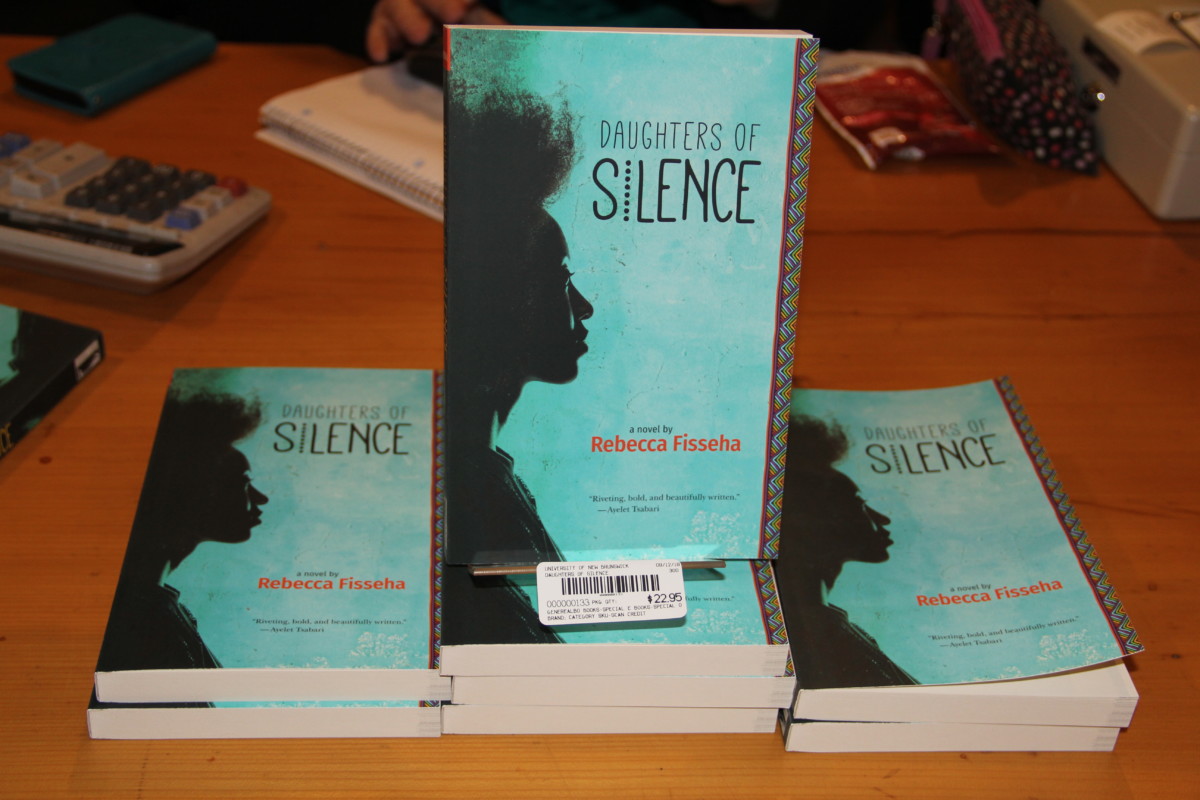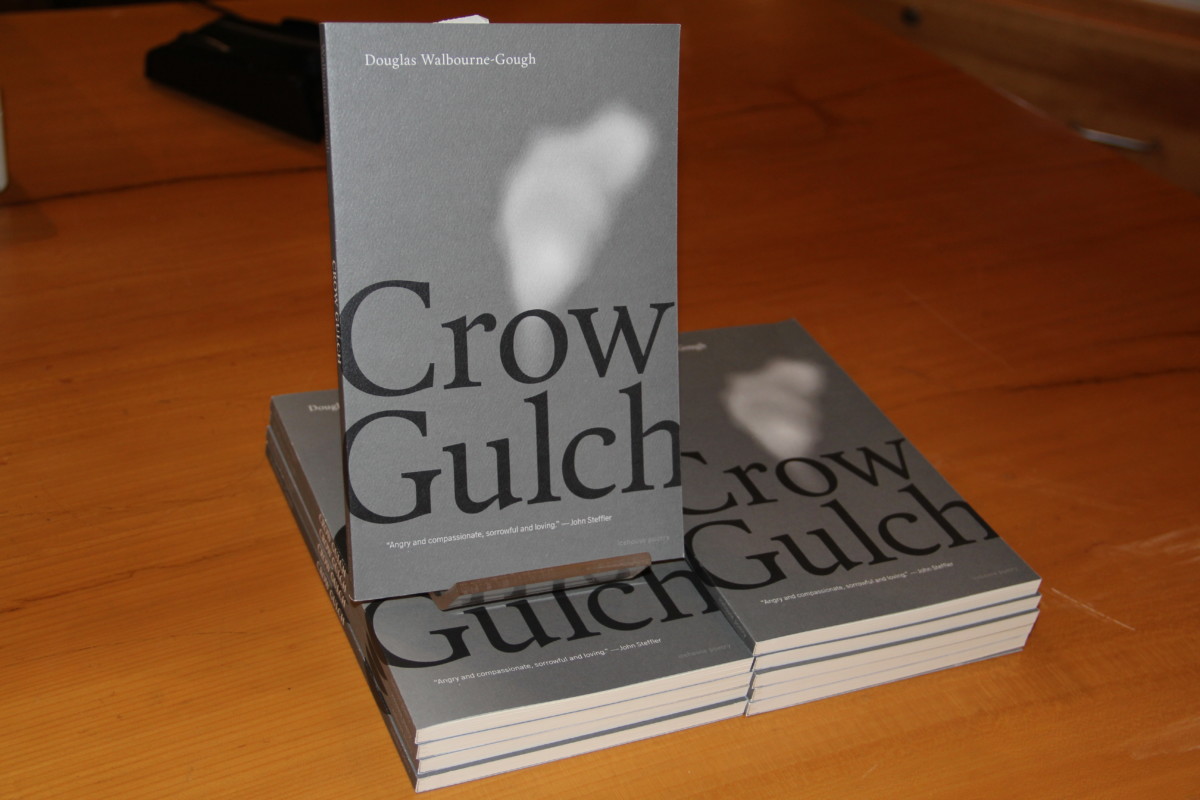
Content warning: This story discusses two books that both deal with difficult subject matter like sexual assault, abuse, death and racism. This story also contains spoilers.
Poet Douglas Walbourne-Gough and author Rebecca Fisseha shared passages from their debut books, both with subject matter strongly connected to their family and personal lives, as a part of the University of New Brunswick’s Reading Series on Nov. 6.
Publishing company Goose Lane Editions presented Walbourne-Gough’s poetry collection Crow Gulch and Fisseha’s novel Daughters of Silence.
Daughters of Silence
Fisseha’s debut novel, Daughters of Silence, addresses the impact of sexual abuse of Habesha girls in Ethiopia.
Habesha refers to people who are from Ethiopia or Eritrea.
The novel tells the story of a flight attendant named Dessie who lives in Ontario. One day the plane she is working on must make an emergency stop due to volcanic ash from Eyjafjallajökull, an Icelandic volcano. The plane happens to make its stop in Dessie’s birthplace, Addis Ababa, Ethiopia – a place she has not been to since her mother left Ethiopia as a diplomat. This eruption is an actual event that happened in April 2010. Planes flying over Europe were impacted for around six days.
Dessie finds herself obligated to go to her grandfather’s house there who is mourning the loss of his daughter, Dessie’s mother, who died of cancer. The book goes on to talk about the sexual abuse epidemic in Ethiopia. It’s revealed that Dessie’s adopted brother had previously sexually assaulted her when she was younger, causing lots of grief and causing Dessie to avoid seeing her family.

Fisseha, like Dessie, was born in Addis Ababa and now lives in Toronto. She relates to the character after experiencing the recent passing of her mother.
“With the character being bereaved and sort of torn up about being back home – that was the headspace I was in at that time. I began the novel in 2011 and by that point my mother had died,” said Fisseha.
“It had been stuff I had been processing for a long time and that was the initial impulse, to explore all the complicated feelings that came with that [grief] through fiction.”
Fisseha began writing professionally in 2003, she wrote plays and did screenwriting. Eight years later, she began writing Daughters of Silence while she was teaching English in China.
“I think it was the isolation of being so far away from everything that was familiar and just feeling like a complete and actual alien in the small town I was teaching at.”
“I think that forced me to turn inward a lot and examine my life and everything that was on my mind.”
“Reminiscent of the deeply immersive writing of Taiye Selasi and Arundhati Roy, Rebecca Fisseha’s Daughters of Silence is psychologically astute and buoyed both by metaphor and by the vibrant colours of Ethiopia,” Goose Lane Editions said on their website.
“It’s an impressive debut.”
Crow Gulch
Douglas Walbourne-Gough’s father’s family lived in Crow Gulch until it was relocated to Corner Brook’s first social housing project, Dunfield Park. His debut collection of poems focuses on the legacy of the community of Crow Gulch near downtown Corner Brook in Newfoundland.
The connection was his inspiration to write his debut collection of poetry, Crow Gulch.
“When I was a young teenager, my dad would tell me these stories about a place he grew up in [Crow Gulch] … a place with a train track running through it,” Walbourne-Gough said.
“So, I guess his memories are what really triggered all of this.”

Crow Gulch began as a shack house that housed migrant workers while the local pulp and paper mill was under construction. Many of the residents who were settled there were of Mi’kmaq ancestry. Walbourne-Gough said some of the residents, including Walbourne-Gough’s ancestors, were called derogatory terms, and the community was eventually abandoned, forcing the residents to leave.
Walbourne-Gough’s poetry has been featured in Riddle Fence, Canadian Literature, Prairie Fire, Newfoundland Quarterly and four other publications.
Walbourne-Gough started writing when he was 21, gaining interest in the craft when he was in university.
“I just wrote really bad things that rhymed,” he said.
He holds an MFA in creative writing from the University of British Columbia Okanagan.
Some of his poetry from Crow Gulch focuses on family, like poems about his grandparents and mother.
“She looks like Princess Diana. The light eyes and her noble nose perfectly askew,” Walbourne-Gough read from his poem about his mother called “Geraldine Winifred Walbourne.”
“Her heart – things of this depth, I’ll simply never know.”
Walbourne-Gough spent nine-and-a-half years on the book, getting it to the point where it is today. He said he doesn’t regret a single second of it since it is all part of the process.
“I’ve gotten several rejection letters before it landed the right home and I think all those rejection letters were necessary,” he said.
Walbourne-Gough said it’s important for young writers to not give up on their dreams of publishing.
“Stay the course. Keep writing.”
Clarification: Previously, this article said “Habesha refers to people who are from the north part of Ethiopia.” The Aquinain did research to determine this information. However, the author of the book said Habesha refers to people who are from Ethiopia or Eritrea. We have provided clarification in the article and used the author’s desired definition.
